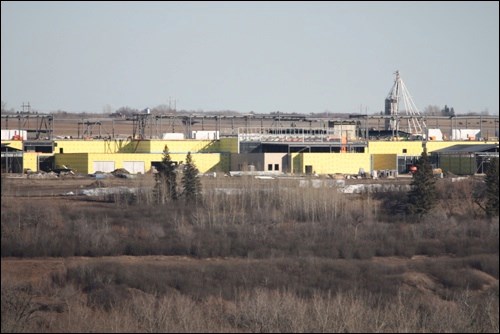One of the partners in the Saskatchewan Hospital project has gone into liquidation.
News broke on Monday that the British-based construction company Carillion PLC had gone into compulsory liquidation in the United Kingdom. Carillion is one of the companies making up the Access Prairies Partnership consortium that is in charge of the Saskatchewan Hospital project as a P3 (public-private partnership).
The Access Prairies Partnership consortium includes Graham Design Builders LP, Carillion Canada Inc., Gracorp Capital Advisors LP, Carillion Private Finance Ltd., Kasian Architecture Interior Design and Planning Ltd. and WSP Canada.
The news prompted immediate speculation about impacts to the Sask Hospital construction. However, the initial indication from SaskBuilds is there will be no impact to the construction, and no impact to taxpayers going forward.
According to a statement from SaskBuilds, “ Construction and completion of the SHNB project will not be affected by Carillion’s liquidation. The government of Saskatchewan’s contract for the project is with Access Prairie Partners (APP). Carillion is only one member of APP, and construction and completion of SHNB will continue.”
The statement further reads: “While APP had designated Carillion to be the company that would provide facility maintenance over the 30-year maintenance and operations phase of the project, if Carillion is not able to provide the service, APP will find a replacement at no additional cost to government.
“We know that APP is aware of Carillion’s situation, and they have committed to keeping the government informed as they work through it to ensure that maintenance services will be in place for SHNB with no additional cost or delay.
“Under the public-private partnership (P3) construction model, APP is responsible for delivering the SHNB on time and on budget. Any failure to do so will result in significant financial penalties for APP. That includes ensuring that a maintenance provider is in place and on site to maintain the facility over the 30-year maintenance and operations phase of the contract.
SaskBuilds also points out that a benefit of the P3 model is that “risks and associated costs are the responsibility of the private sector partners, not government. That means that if a new maintenance provider is needed, all responsibility to find that provider and have them in place in time for the facility to open is entirely the responsibility of APP. And, if there are any additional costs, those will also be entirely APP’s to bear.”
The news has drawn swift negative reaction from the NDP. Battlefords provincial candidate Rob Feist said on Twitter that “the Sask Party’s decision to build the new Sask Hospital as a P3 project has been a complete failure.”
Opposition critic Danielle Chartier blasted the P3 in a news release from the NDP caucus.
“At roughly $6 million per year, maintaining this one P3 hospital will cost Saskatchewan people significantly more than what was the annual budget for maintaining the entire Prairie North Health Region,” Chartier said in a statement. “The contract locks us in for 30 years but now, the company may not even be around in 30 days.”
The news of Carillion’s liquidation has been an even bigger story across the Atlantic, where the private company was involved in several projects across the United Kingdom and held numerous public-sector contracts.
The BBC was reporting Monday morning that the British government would hold an emergency meeting to “keep vital public services” going following the collapse of the company. It is not known yet what might be happening from a Canadian standpoint.
In the wake of the collapse, Labour opposition leader Jeremy Corbyn called for “an end to the rip-off privatization policies that have done serious damage to our public services and fleeced taxpayers of billions of pounds.”



